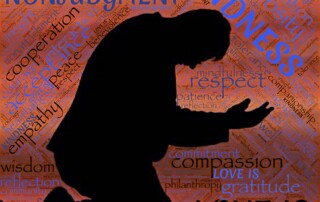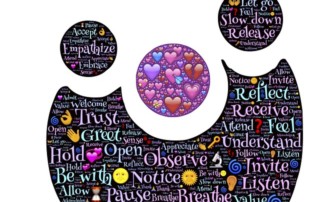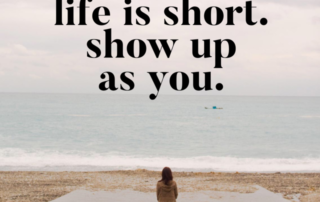What to do when doing the *Right Thing* feels hard
First, Happy Mother’s Day!
Second, I want to share a story from yesterday when it was really challenging to do the “right” thing. And at the end I’ll share my process for making choices in the moment when I feel challenged.
I don’t like to look at things from a right/wrong perspective. Instead, I choose to see things from a lens of what is aligned with my values and what isn’t.
Yesterday, it took all of my focus to reframe a situation – as it was happening – when a driver did something that was way out of integrity with my values. In the moment, I felt like I couldn’t do anything about it.
If you prefer to listen to this story, click below. It’s in 2 parts because I didn’t figure out how to combine them – yet! 😉
Part 1 is here – 7min listen.
Part 2 is here – 5 min listen.
We were leaving the college campus after my 18 yr old’s graduation. She entered the college at 15 as a high school student (proud homeschooling mama moment).
The parking lot looked like a Taylor Swift concert. When we finally got on the main road out, this black shiny Honda with blacked out windows was trying to get in front of my husband (husband was driving).
I don’t know about you, but I drive with the unspoken car etiquette that when in traffic, we let the car in front of us in, then we go, then the car behind us lets a car in and they go, etc…
Well, after my husband lets the car in front of us in, Mr. Honda wants to move in, too. So my husband moves up a tad in the still jammed lane.
But then Mr. Honda gets close enough to the car in front of him that he taps the bumper of it. Lightly. But still makes contact.
As soon as I see that, and my husband again starts to inch forward, I’m telling him to STOP because #1) it’s clear to me this guy doesn’t give a shit if he hits our car or not, and #2) it’s not worth getting into an altercation or accident over this.
After much persuasion (and we had time to talk because, again, the lot was like a Swiftie concert), my husband lets the car in.
Mr Honda then rolls down his blacked out windows and makes direct eye contact with both of us in his mirror. He’s smiling, laughing and gesturing with his hands as if to say, “Haha – I got you. I got what I wanted” as his rap music blared from his souped up Honda Civic. That’s the nice version. He was probably saying something totally different!
What I didn’t know until we got home was that this punk (yes, I have total judgment) had rolled down his window and made faces and hand gestures to my husband while we were in the parking lot. But I didn’t see it because I was looking at my husband and trying to convince him to let it go, and let the guy in front of us.
My husband left that part out, in the moment. And it’s probably a good thing he did, as I may have gotten out of my car and wanted to “educate” this young punk, and this story might’ve had a different ending.
Through his own rage, my husband was just trying to “do the right thing.”
This brought up a conversation around how difficult it can feel to do the *right thing* when others are acting in ways that are so out of alignment with our values.
We want to react. We want them to see how their actions aren’t showing respect or consideration for others. And tell them how their actions are impacting us. Or we want to scream at them to “Just just do the *right* fu#%ing thing!”
We realized it can seem like we don’t have another choice in these situations, or like we have to give up our values in order to do what’s right.
However, being “right” is subjective, so we have to find *our* right. We have to know what matters to us, and what feels important. And if we want any kind of connection with others, we want to find out what matters to them as well.
Questions to ask yourself when presented with a challenge like this:
- How would your 2-hours-later-version-of-you handle this?
- What matters most to you in this moment?
If something like this happens to you, I suggest you tune in to what matters to you in that moment. What would the 2-hours-later-version-of-you wish you’d done or said?
For me, I was concerned for our safety. I hadn’t seen the driver, so I didn’t know who was behind the wheel. Though, I’ll be honest, I expected it to be some young punk like it was (total judgment). But I was also thinking I don’t want the hassle of dealing with an “accident” if this turns into an altercation.
We’d just gotten our new car after replacing it with a previous new car that was totaled 6 days after we got it when a guy ran an intersection. I’m still dealing with the details of that.
So, I also valued my time and didn’t want to waste any more energy resulting from some kid that had zero respect for others.
My husband also wanted respect, and was feeling furious that he was having to step down and stay quiet because speaking up could cause a major issue. And I get it. He wanted to express his rage. So, on the way home I invited him to let the jackals run (In nonviolent communication we refer to our judgments as jackals since they’re judgy, critical and condemning).
My daughter, now frustrated with both of us for continuing our jackal show said, “Omg are you done yet?!”
But no, we weren’t. We were still processing and expressing.
I’ll end this by asking a question and offer a suggestion. Can you relate to this?
What have you done in this kind of situation, and what do you wish you would have done? And what would the 2-hours-later-version-of-you have done if they would’ve connected to what was most important to them in that moment?
THAT’s the place I want to respond from. The place where I’m connecting to what matters most to me, so I know I’m in integrity with my values, with each choice I make.
Hope this helps you tune into what’s in alignment with you. It reminded me how I want to show up in the world. And it’s not like that little punk! Yes, I’m still in judgment. 😉
Would love to hear what comes up for you in reading or listening to this. Simply click reply and let me know!
PS- Photo credit is from johnhain.com









